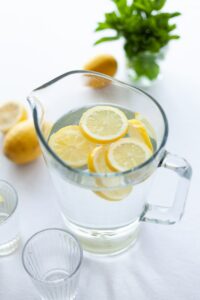HOW PROPER HYDRATION CAN ALLEVIATE PMS SYMPTOMS
PMS (premenstrual syndrome) consists of a range of physical and emotional symptoms that a woman can experience during the days or weeks leading up to the bleeding. It can vary in severity and type of symptom: there are over 150 symptoms associated with PMS, from bloating and headaches to mood swings and fatigue. The cause of PMS is not entirely clear, but it is probably related to hormonal changes that occur during the menstrual cycle. While PMS is a common experience for many women, it can still be challenging to manage and can significantly impact daily life.
Thankfully, there are many nutritional strategies that can help to alleviate symptoms. Did you know that proper hydration can play a significant role in reducing the severity of PMS? In this article, we’ll explore the link between water and PMS symptoms and give you tips on how to stay hydrated during this time of the month.
How water can help manage PMS symptoms
Water is essential for good health, and when it comes to PMS, it can play a crucial role in reducing the severity of symptoms. Here are a few ways that water can help:
Reducing bloating. One of the most common symptoms of PMS is bloating. This can be caused by water retention, which means that your body is holding onto excess fluid. Drinking plenty of water can help reduce water retention and flush out excess fluid, thereby reducing bloating.
Relieving headaches. Headaches are another common symptom of PMS. Dehydration can cause headaches, so staying hydrated can help prevent them. It’s important to note that drinking sugary drinks or caffeine can actually make headaches worse, so it’s best to stick to water.
Boosting energy levels. Fatigue is another symptom of PMS that can be challenging to manage. Drinking enough water can help boost your energy levels and reduce fatigue. When you’re dehydrated, your body has to work harder to perform everyday functions, which can leave you feeling tired.
How to stay hydrated during PMS
Now that you know the benefits of staying hydrated during PMS, let’s explore some tips on how to do so.
Drink plenty of water. The most obvious way to stay hydrated is to drink plenty of water. The general recommendation, according to the NHS (National Health Service) is to drink between 6 to 8 glasses of water a day, but during PMS, you may need more. Try carrying a water bottle with you throughout the day to remind yourself to drink water regularly. Infuse water with fruit and herbs can also be a good way to make it more palatable. Try lemon slices or fresh mint leaves to have a refreshing beverage.
Eat water-rich foods. In addition to drinking water, you can also stay hydrated by eating water-rich foods. Some examples include watermelon, cucumber, tomatoes, strawberries, celery, and lettuce. These foods can help you stay hydrated and have the added benefit of providing essential nutrients that can help manage PMS symptoms and promote overall health.
Avoid/limit sugary drinks and caffeine. As mentioned earlier, sugary drinks and caffeine can actually make PMS symptoms worse. These beverages can dehydrate you and cause headaches, which can make other symptoms worse. Instead, stick to water, herbal tea, or other non-caffeinated drinks. If you are a coffee lover like me, limit your consumption to couple di coffees during the pre-menstrual and bleeding phase, or alternatively go for decaf. In terms of sugary drinks, I would limit or avoid them altogether, as they are usually high in sugar and therefore promote insulin dysregulation.
Conclusion
Staying hydrated is essential for good health, and it’s especially important during PMS. By drinking plenty of water, eating water-rich foods, avoiding sugary drinks and limiting caffeine, you can help reduce the severity of PMS symptoms such as bloating, headaches, and fatigue. By staying hydrated, you can help reduce the severity of your symptoms and feel better overall.








